New Jersey Governor signs anti-confinement measure, signaling to some farm-state lawmakers in Congress that neither Democrats nor Republicans in the Garden State think it’s acceptable to employ immobilizing crates for the intelligent, sensitive animals.
Washington, D.C. — Animal Wellness Action, the Animal Wellness Foundation, and the Center for a Humane Economy applauded Governor Phil Murphy for signing into law the latest state ban on extreme confinement of breeding sows. The measure passed the Senate some weeks ago 35 to 1 and passed the Assembly by a count of 73-1. New Jersey is the 11th state to adopt an anti-gestation crate policy.
S. 1298/A.1970, which also bans immobilizing crates for veal calves, was sponsored by Sen. Vin Gopal and Assemblyman Raj Mukherji, and the animal wellness organizations extended thanks to them for their humane-minded leadership.

The legislative action builds on a May ruling from the Supreme Court of the United States upholding California’s Prop 12, which not only affords breeding sows, laying hens, and veal calves minimum space requirements, but also restricts the sale of pork factory farms relying on extreme-confinement housing. In response to the Supreme Court ruling, written by Justice Neil Gorsuch, some federal lawmakers are working to attach the Exposing Agriculture Trade Suppression Act, H.R. 4417 and S. 2019, to the Farm bill. The EATS Act would repeal state laws that restrict agricultural commerce, including Prop 12 passed in 2018 and a similar measure passed by Massachusetts voters two years prior. The biggest beneficiary of the attack on state’s rights would be Smithfield Foods, the Chinese-owned and CCP-controlled company that produces one in six pigs raised for slaughter in the United States.
Animal Wellness Action and hundreds of other animal welfare, food safety, states’ rights, and other organizations have denounced the EATS Act as an attack on states’ rights and a boon for China as it seeks greater control of the U.S. food supply.
“We must move past the era of immobilizing animals for years on end as a customary animal-rearing strategy,” said Wayne Pacelle, president of Animal Wellness Action and the Center for a Humane Economy. “Immobilization is a form of punishment and torment, not a responsible way to raise animals.”
Breeding pigs may spend up to three years intensively confined in a crate barely larger than the animal, resulting in extreme physical and psychological torment. The sow may weigh 300-600 pounds, and the 2-by-7 crate immobilizes her, inhibiting her from even turning around or taking more than a half step. Pigs raised for meat are not kept in these restrictive crates.
“Confining sows in crates that immobilize them is demonstrably inhumane and there are widely accepted and applied alternative housing methods,” said Jim Keen, D.V.M., Ph.D., the director of veterinary sciences for the Center for a Humane Economy. Dr. Keen served on the faculty at the University of Nebraska College of Veterinary Medicine and also worked for USDA for 20 years at the National Meat Animal Research Center.
“Keeping a sow in a two-foot-wide crate is akin to stuffing a large-bodied animal in a tiny little closet and never letting her out,” said Thomas Pool, D.V.M., the senior veterinarian with Animal Wellness Action. A retired Colonel in the U.S. Army, Dr. Pool grew up on a cattle ranch outside of Lawton, Okla. and served as the commander of the Army Veterinary Command.
Related to the New Jersey news, a national bill was recently introduced, the Pigs in Gestation Stalls (PIGS) Act, H.R. 2939, to ban the extreme confinement of mother pigs in gestation crates. Rep. Veronica Escobar is the lead author of that legislation.
Almost every major food retailer in the United States — from McDonald’s to Costco to Cracker Barrel — has made a pledge to phase out sourcing pork from factory farms that confine sows in gestation crates, with most pledges originally set to take effect in 2022. Voters have approved all five ballot measures in four states to ban the use of gestation crates in Arizona (2006), California (two separate ballot initiatives in 2008 and 2018), Florida (2002), and Massachusetts (2016). Major pig-producing states, including Colorado, Michigan, and Ohio, are phasing out gestation crates by law.


